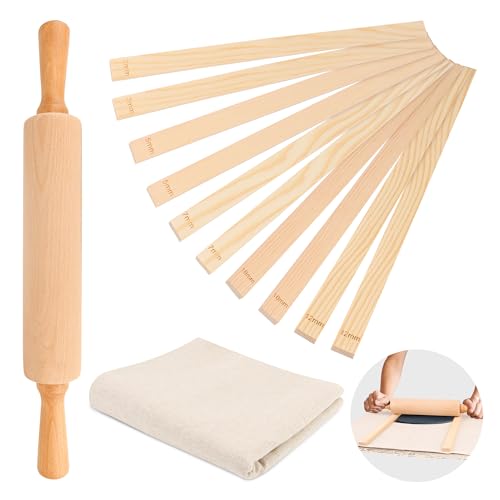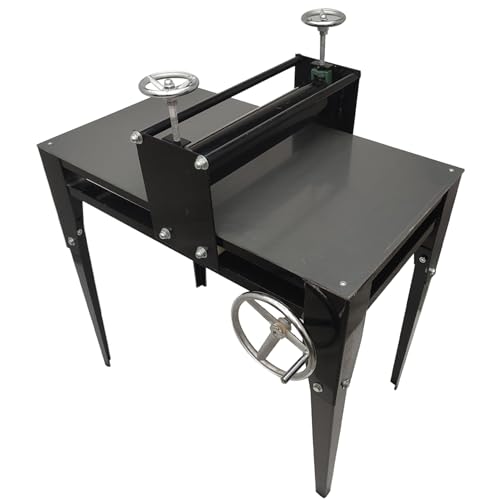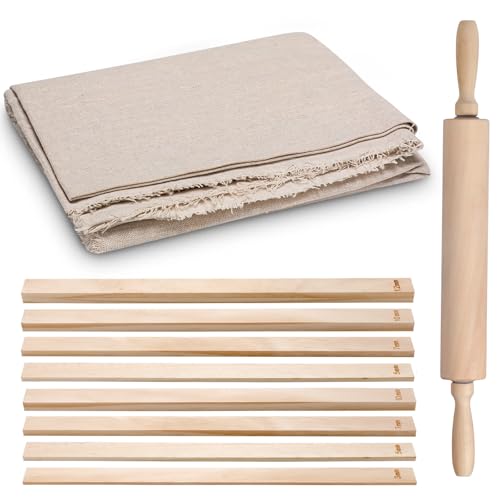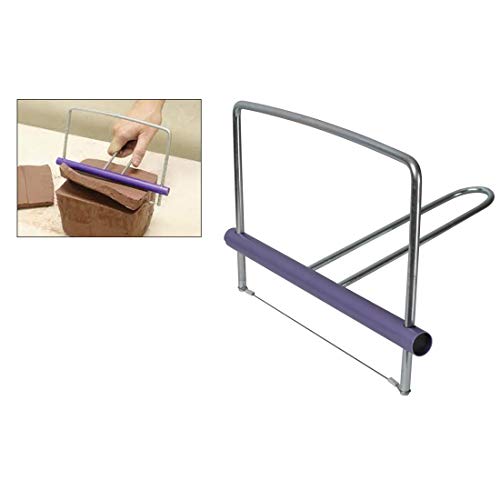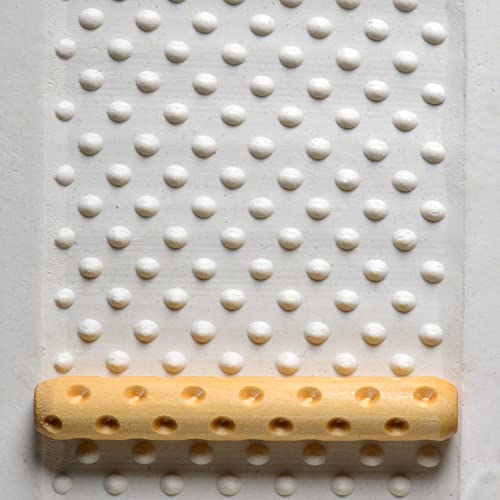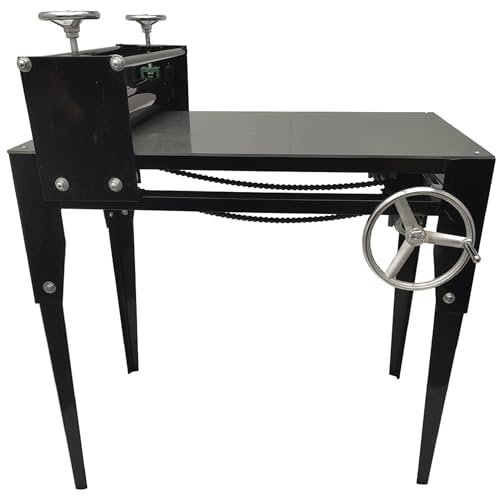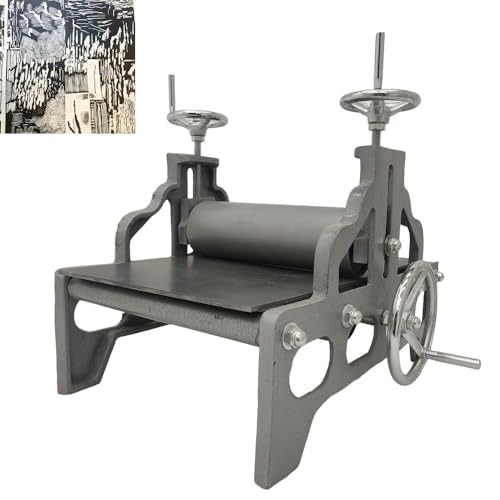When you’re looking for the best slab rollers for clay, it’s important to find one that fits your specific needs. Whether you prefer manual or electric options, each type offers unique benefits. In this guide, we’ll explore top picks that combine durability, ease of use, and portability. You might be surprised by what’s available, so stay tuned as we break down the features of each selection that could enhance your pottery experience.
12 Pcs Pottery Tools Teaching Set with Slab Roller and Wooden Rolling Pin Guides
If you’re a pottery enthusiast or educator looking to enhance your clay projects, the 12 Pcs Pottery Tools Teaching Set is an ideal choice. This set features a 17-inch slab roller and ten wooden rolling pin guides, allowing you to achieve precise thicknesses from 0.12 to 0.47 inches. The sturdy wooden materials guarantee durability, while the breathable linen tablecloth protects your pottery from cracking. Simply place your clay on the tablecloth, use the guides, and roll out a perfectly flat slab. Whether you’re in a classroom or studio, this versatile set makes shaping clay easier and more enjoyable.
Best For: Pottery enthusiasts, educators, beginners, and professionals seeking a comprehensive toolset for clay shaping and rolling.
Pros:
- Durable wooden materials ensure long-lasting use and reliability.
- Five thickness options provide flexibility for various pottery projects and prevent over-compression of clay.
- Breathable linen tablecloth helps protect pottery from cracking due to humidity.
Cons:
- The set may require additional tools for more advanced pottery techniques.
- Limited to rolling and shaping; does not include tools for firing or glazing.
- Weight may be cumbersome for travel or portability.
TECHTONGDA Manual Ceramic Clay Plate Machine
The TECHTONGDA Manual Ceramic Clay Plate Machine is perfect for pottery enthusiasts who appreciate hands-on creativity without the need for electricity. With dimensions of 33.8 x 20 x 10.9 inches and a robust iron frame, it guarantees durability. Adjust the thickness up to 1.77 inches using the two knobs for uniformity, while the large handwheel allows smooth roller movement. Weighing 107 pounds, it’s stable yet portable when needed. This slab roller is ideal for making ceramic crafts, though remember to use a felt blanket during pressing. Rated 4.0 out of 5 stars, it’s a reliable addition to your studio.
Best For: Pottery enthusiasts and ceramic craft operators seeking a manual slab roller for hands-on creativity without electrical reliance.
Pros:
- Durable Construction: Made from rust-resistant iron, ensuring long-lasting use.
- Adjustable Thickness: Allows for precise thickness adjustments up to 1.77 inches for uniform clay slabs.
- Portable Design: Weighing 107 pounds, it offers stability yet can be easily moved when necessary.
Cons:
- Manual Operation: Requires physical effort and may not be suitable for those preferring automated machines.
- Weight: At 107 pounds, it may be cumbersome for some users to handle or transport.
- Felt Blanket Requirement: Necessitates a felt blanket during pressing, which adds an extra step to the process.
Newtay 12 Pcs Pottery Tools Set
For both beginners and experienced potters, the Newtay 12 Pcs Pottery Tools Set offers an excellent combination of quality and versatility. This set includes a wood rolling pin, a portable wedging board, and ten rolling mud stick guides in various sizes, all designed for smooth scrolling and shaping. Weighing just 2.01 pounds and featuring a compact design, it’s perfect for small spaces. Users appreciate its durability and ease of use, making it a fantastic starter kit. Whether you’re working on detailed sculpting or larger pottery projects, this set guarantees consistent slab thickness and enhances your creative expression.
Best For: The Newtay 12 Pcs Pottery Tools Set is best for both beginners and experienced potters looking for a durable and versatile pottery toolset.
Pros:
- High-quality materials ensure durability and resistance to breakage and rust.
- Compact design makes it suitable for small workshops and classrooms.
- Variety of tools allows for precise control in achieving consistent slab thickness.
Cons:
- The wood materials may require occasional maintenance to prevent wear over time.
- Some users may find the set lacks specialized tools for very advanced pottery techniques.
- Weight of the set might be slightly heavier for those who prefer ultra-light tools.
AMACO 1473770 Adjustable Handled Clay Slicer, Stainless Steel
Crafted with heavy stainless steel wire, the AMACO 1473770 Adjustable Handled Clay Slicer is perfect for artists and potters who demand precision in their work. This versatile tool lets you create even and precise cuts, making it ideal for tiles, slabs, or extrusions. With an adjustable handle guide bar, you can easily cut slabs ranging from 1/8 to 4-3/8 inches thick and up to 7 inches wide. Whether you’re in a pottery room, art class, or home studio, this slicer enhances your cutting experience, making it suitable for both beginners and seasoned users alike.
Best For: Artists and potters seeking precision and versatility in cutting clay for their projects.
Pros:
- Durable construction: Made from heavy stainless steel wire for longevity and reliability.
- Adjustable cutting capabilities: Allows for slabs ranging from 1/8 to 4-3/8 inches thick and up to 7 inches wide.
- User-friendly design: Easy to use for both beginners and experienced users, enhancing the overall cutting experience.
Cons:
- Limited to clay: Primarily designed for clay, which may not suit those needing a multi-purpose cutting tool.
- Adjustable mechanism may wear: Frequent adjustments could lead to wear over time affecting precision.
- Requires maintenance: Stainless steel wire may require periodic cleaning to maintain optimal performance.
Creative Hobbies Hardwood Pony Roller for Ceramic and Crafting
Artists and crafters searching for a reliable tool will find the Creative Hobbies Hardwood Pony Roller an essential addition to their toolkit. This versatile 2-in-1 roller excels in ceramic, pottery, and various craft projects. Its dual design features a larger roller for smoothing clay and a smaller one for intricate details. Weighing just 4.8 ounces, it’s easy to handle, ensuring a comfortable grip during use. With a customer rating of 4.7 stars, it’s well-received for its durability and effectiveness. Plus, it makes a thoughtful gift for any artist looking to enhance their creative endeavors.
Best For: Artists, crafters, and pottery enthusiasts who are looking for a versatile and durable tool to enhance their creative projects.
Pros:
- Durable hardwood construction ensures longevity and a comfortable grip.
- Dual roller design allows for both smoothing larger areas and detailing intricate designs.
- Highly rated by customers for its effectiveness across a variety of crafting applications.
Cons:
- Some users have reported minor squeaking noises during use.
- A few customers have noted glue residue on the rollers upon purchase.
- May not be suitable for very large projects due to its compact size.
11.8 X 19.7 Heavy Duty Etching Press for Printmaking
When you’re looking for a reliable etching press, the 8 X 19.7 Heavy Duty Etching Press is an excellent choice for both novice and experienced printmakers. This professional-grade, manual press operates without electricity, giving you complete control over speed. Its adjustable roller thickness accommodates various printing needs, making it versatile for relief plates and pressed artworks. The simple design features a detachable frame, hand wheel, and panel, ensuring easy transport. Weighing 42.2 pounds, it’s sturdy yet portable, ideal for schools, studios, or home use. Plus, it’s a fantastic investment for creative exploration in printmaking.
Best For: This etching press is best for artists, educators, and hobbyists looking for a reliable and versatile printmaking tool that operates manually without electricity.
Pros:
- Versatile functionality with adjustable roller thickness for various printing techniques.
- Portable design with a detachable frame for easy transport and storage.
- No electricity required, allowing for complete control over speed and operation.
Cons:
- Manual operation may require more physical effort compared to electric presses.
- Weight of 42.2 pounds could be cumbersome for some users to move around frequently.
- Limited printing area of 11.8 x 19.7 inches may not suit larger projects.
MKM Pottery Tools Wood Hand Rollers for Clay (HR-12 Dots)
For those who love adding intricate textures to their clay creations, the MKM Pottery Tools Wood Hand Rollers (HR-12 Dots) are an excellent choice. Measuring 4 inches long and 0.6 inches in diameter, these lightweight rollers are precision carved to create unique patterns. They work beautifully with natural, polymer, and precious metal clays, allowing you to roll them across slabs or thrown pots for decorative effects. Finished with oil for durability, they’re easy to clean with a soft toothbrush if clay sticks. With an impressive 4.4-star rating, these tools are a favorite among potters for their quality and versatility.
Best For: Potters and crafters looking to add unique textures to their clay projects with versatile and easy-to-use tools.
Pros:
- Versatile use with various types of clay, including natural, polymer, and precious metals.
- Precision carved to create distinct and intricate texture patterns effortlessly.
- Durable design finished with oil, making it easy to maintain and clean.
Cons:
- Limited length of 4 inches may not suit all project sizes.
- Potential for clay sticking if not properly cared for, requiring additional cleaning.
- Lightweight design may not provide enough pressure for larger clay slabs.
HQHAOTWU Ceramic Clay Plate Machine for Pottery Making
The HQHAOTWU Ceramic Clay Plate Machine is perfect for pottery enthusiasts and beginners enthusiastic to explore their creativity. This manual pottery making machine features an adjustable slab roller with dimensions of 17.5 by 3.1 inches, allowing you to press clay up to 1.77 inches thick. Its manual operation saves energy, while the sturdy iron frame guarantees long-lasting durability. You’ll appreciate the user-friendly handwheel for easy roller movement and the detachable frame for simple transport. Ideal for art schools and DIY projects, it’s an excellent choice for anyone looking to enhance their ceramic crafting skills effortlessly.
Best For: Pottery enthusiasts and beginners looking to explore their creativity in ceramic crafting.
Pros:
- Energy-efficient manual operation eliminates the need for electricity.
- Sturdy build with a durable iron frame ensures long-lasting use.
- User-friendly design with adjustable functionality makes it suitable for all skill levels.
Cons:
- Manual operation may be challenging for those seeking automated solutions.
- Limited thickness capability of 1.77 inches may not meet all project requirements.
- Transportability could be hindered by the weight of the sturdy frame.
JARYANNIX Portable Slab Roller Machine for Artists and Printmakers
Designed specifically for artists and printmakers, the JARYANNIX Portable Slab Roller Machine combines functionality with portability, making it an ideal choice for those who need a reliable tool without being tethered to electricity. Weighing just 40.8 pounds, its compact design is perfect for tabletop use, allowing you to create in various settings. The manual operation features a large handwheel for easy handling and precise pressure control, accommodating different thicknesses. With an enlarged roller for improved printing quality, this versatile machine works well for relief plates and embossed artworks, making it a must-have for craftsmen and art creators alike.
Best For: Artists and printmakers looking for a portable, manual slab roller that offers flexibility and precise control in various creative environments.
Pros:
- Portable Design: Lightweight and compact, making it easy to transport and use on tabletops.
- Manual Operation: No electricity required, allowing for use in any setting and providing greater control over the printing process.
- Versatile Applications: Suitable for creating relief plates, gravure printing, and embossed artworks, making it a valuable tool for diverse artistic projects.
Cons:
- Weight: At 40.8 pounds, it may be cumbersome for some users to move frequently.
- Manual Operation: Requires physical effort to operate compared to electric models, which may be a drawback for some users.
- Limited Warranty Information: Warranty details are only available upon request, which could lead to uncertainty for potential buyers.
DIYOOHOMY 10 Pcs Rolling Pin Guides for Dough Thickness
Achieving consistent dough thickness is effortless with the DIYOOHOMY 10 Pcs Rolling Pin Guides, making them an essential tool for both novice and seasoned potters. Each guide, crafted from durable pine wood, measures 17 inches in length and offers five different thicknesses: 3mm, 5mm, 7mm, 10mm, and 12mm. Just place the desired guide on either side of your clay, roll your pin, and enjoy uniform results every time. Weighing only 11.7 ounces, they’re easy to handle and store. With a solid 4.5-star rating, these guides elevate your pottery, ensuring precision and professional-looking outcomes.
Best For: DIYOOHOMY 10 Pcs Rolling Pin Guides are best for both beginners and experienced potters seeking consistent and professional dough thickness.
Pros:
- Precision: Ensures uniform thickness for a variety of dough and clay projects.
- Durable Material: Made from high-quality pine wood, offering stability and longevity.
- Versatile Use: Suitable for clay, cookie dough, fondant, and more, making it a multifunctional tool.
Cons:
- Minor Warping: Some users have reported minor warping, which may affect performance over time.
- Care Required: Guides need to be kept dry after use to maintain their condition.
- Limited Thickness Options: While there are five thicknesses, some users may desire additional sizes for more versatility.
Factors to Consider When Choosing a Slab Roller for Clay
When choosing a slab roller for clay, you’ll want to contemplate several key factors. Think about the size and dimensions that fit your workspace, as well as the material quality for durability. You’ll also need to decide between manual and electric models, and whether portability is important for your projects.
Size and Dimensions
Choosing the right size and dimensions for a slab roller can greatly impact your clay work, as it directly influences the maximum slab size you can create. For instance, some models have a roller size of 17.5 x 3.1 inches, allowing for various slab thicknesses. You’ll also want to take into account the overall dimensions of the machine; larger models, like those measuring 33.8 x 20 x 10.9 inches, need more workspace and storage. Adjustable thickness settings are essential too, with some rollers accommodating slabs up to 1.77 inches thick. If your workshop is small, a compact design is ideal for easy management. Finally, think about weight—heavier models around 107 pounds require dedicated space, while lighter options enhance portability.
Material Quality
Material quality plays an essential role in the performance and longevity of a slab roller for clay. When choosing a slab roller, look for models with iron frames, as they offer rust resistance and durability. Sturdy construction using heavy-duty stainless steel or high-quality wood guarantees reliable performance and reduces wear over time. You’ll also appreciate self-lubricating engineering plastics in axle sleeves and gears, which minimize maintenance needs and enhance smooth operation. Additionally, products made from breathable, moisture-proof materials help prevent your clay from cracking due to humidity during the rolling process. Remember, the components used for thickness adjustments should be durable to assure consistent and precise control over slab thickness without deformation, assuring your work remains flawless.
Adjustable Thickness Features
While selecting a slab roller for clay, adjustable thickness features are vital for achieving the precision you need in your pottery projects. These features allow you to control the slab’s thickness, accommodating various clay types and project needs. Many slab rollers offer maximum adjustments up to 1.77 inches, giving you flexibility in your creations. You can easily adjust the thickness using knobs or handwheels, ensuring consistent results across multiple pieces. Setting specific thickness levels helps prevent over-compression, which is essential for maintaining the integrity of your clay during shaping. Some rollers even provide multiple thickness options, enhancing your versatility for different artistic techniques and applications. Choosing the right adjustable thickness feature can greatly impact your pottery work.
Manual vs. Electric
When deciding between a manual and an electric slab roller for clay, it’s essential to weigh your specific needs and preferences. Manual slab rollers are often more portable and cost-effective, making them ideal for small studios or individual use. However, they do require effort and practice to master thickness adjustments. On the other hand, electric slab rollers minimize physical strain, allowing for quick, consistent results, particularly beneficial if you’re producing larger quantities. They typically feature precise controls but may need regular maintenance due to their electrical components. Consider the maximum thickness you need, as some manual options can roll up to 1.77 inches, while electric models may vary. Choose the one that best aligns with your workflow.
Portability and Weight
Choosing the right slab roller isn’t just about whether it’s manual or electric; portability and weight play a significant role too. Heavier models often provide better stability during use, but they can be cumbersome to transport. Lightweight designs with detachable frames boost portability, making it easier to move your slab roller between locations. Also, consider the dimensions; smaller machines tend to be more convenient for storage and transport. If you prefer flexibility, look for manual models that don’t require electricity, allowing you to work anywhere. Finally, remember that construction materials impact weight; while durable iron frames offer stability, lighter materials may sacrifice some sturdiness. Balancing these factors is key to finding the perfect slab roller for your needs.
